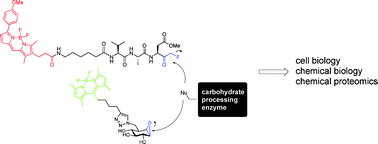In this review, we will discuss the enzymes that are involved in the synthesis and degradation of glycoconjugates and we will give an overview of the inhibitors and activity-based probes (ABPs) that have been used to study these. Following discussion of some general aspects of the biosynthesis and degradation of N-linked glycoproteins, attention is focused on the enzymes that hydrolyze the protein–carbohydrate linkage, peptide N-glycanase and glycosylasparaginase and their mechanism. We then focus on the biosynthesis of O-linked glycoproteins and glycolipids and in particular on the enzymes that hydrolyze the interglycosidic linkages in these, the glycosidases. Some important mechanism-based glycosidase inhibitors that form a covalent bond with the targeted enzyme(s), their corresponding ABPs and their application to study this class of enzymes are highlighted. Finally, alternative pathways for degradation of glycoconjugates and an ABP-based strategy to study these will be discussed.
You have access to this article
 Please wait while we load your content...
Something went wrong. Try again?
Please wait while we load your content...
Something went wrong. Try again?


 Please wait while we load your content...
Please wait while we load your content...